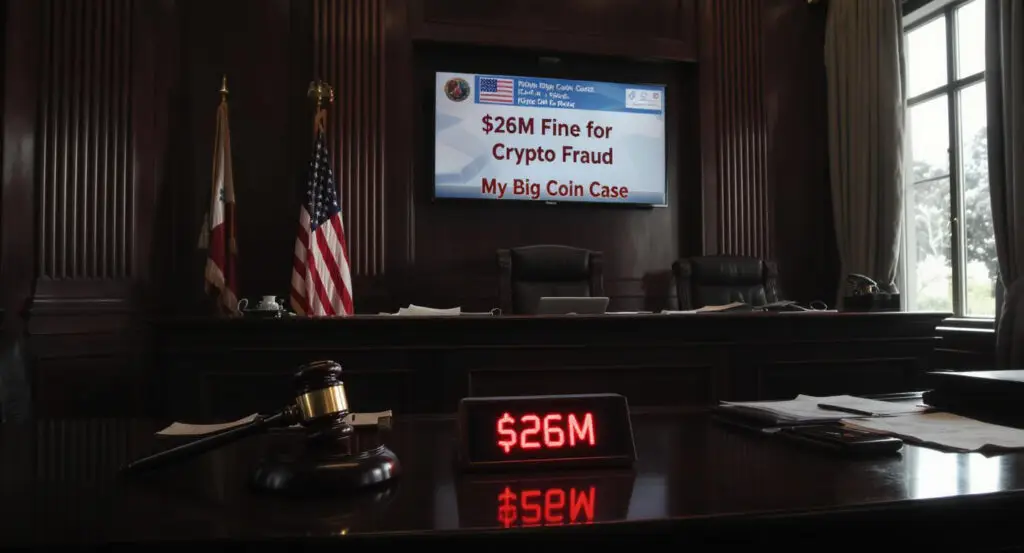A Boston federal court has handed down a sweeping ruling in one of the cryptocurrency industry’s earliest and most infamous fraud cases, ordering the defunct company My Big Coin to pay nearly $26 million in penalties and restitution. The case, which spanned nearly a decade, centred on allegations that the company misled investors with false promises of a gold-backed digital currency and a legitimate trading platform that never existed.
The Commodity Futures Trading Commission (CFTC), which brought the case, successfully argued that My Big Coin and its principals, Mark Gillespie and John Roche violated U.S. commodities law by defrauding 28 investors out of more than $6 million between 2014 and 2017.
A Gold-Backed Mirage
At the heart of the scheme was the claim that My Big Coin offered a cryptocurrency backed by physical gold reserves, an assertion that turned out to be entirely fabricated. The CFTC presented evidence showing that Gillespie and Roche not only invented the token’s value proposition but also promoted a functioning exchange that did not exist.
Instead of building a platform or securing gold reserves, the pair allegedly used investor funds for personal expenses. As regulators told the court, “There was no trading, no backing, and no transparency just a carefully crafted illusion.”
The court agreed, ruling that Gillespie and Roche’s actions constituted a clear violation of the Commodity Exchange Act. The penalty includes approximately $19 million in civil fines for commodities fraud and $6 million set aside for victim restitution.
Little Hope for Victims
While the court’s ruling offers some measure of justice, the prospects for actual financial recovery remain bleak. In a statement following the decision, the CFTC acknowledged that most of the investor funds had already been spent. “Although restitution has been ordered, there is little to no chance that victims will be made whole,” the agency noted.
This caveat underscores a frustrating truth familiar to many early crypto investors: recovering losses from fraud in the unregulated Wild West of early blockchain ventures is often more symbolic than practical.
Bans and Consequences
In addition to the monetary penalties, Gillespie and Roche are permanently banned from participating in any future ventures that fall under the oversight of the CFTC. This includes any involvement in commodity trading, digital asset offerings, or derivatives platforms.
A third defendant named in the original case, Michael Kruger, was not included in the final ruling due to his death during the proceedings.
The judgement effectively closes the legal chapter on one of the earliest high-profile crypto cons, signalling a continuing push by U.S. regulators to clean up the industry’s chequered past.
A Growing Ledger of Enforcement
The My Big Coin case is far from an isolated incident. It adds to a growing list of enforcement actions aimed at rooting out fraudulent activity from the early years of cryptocurrency development. In recent months, U.S. regulators have stepped up efforts to crack down on misleading token sales, fraudulent exchanges, and other forms of crypto-related misconduct.
From pump-and-dump schemes to fake presales, early crypto scams often flourished in a legal grey area until agencies like the CFTC and SEC began asserting their regulatory authority.
The My Big Coin case, which has taken nearly a decade to fully adjudicate, reflects the slow but steady evolution of crypto law enforcement. It also serves as a warning: even years-old scams are not immune from scrutiny, and accountability may still come knocking.
Looking Forward
As the crypto sector continues to mature, so does the legal framework around it. While regulators work to build clearer guidelines for token issuance, platform integrity, and investor protection, legacy cases like My Big Coin remind the public and policymakers alike of the pitfalls that defined the early crypto era.
For now, the ruling marks a major symbolic win for U.S. oversight agencies—and a cautionary tale for anyone hoping to skirt regulation in the blockchain economy.























